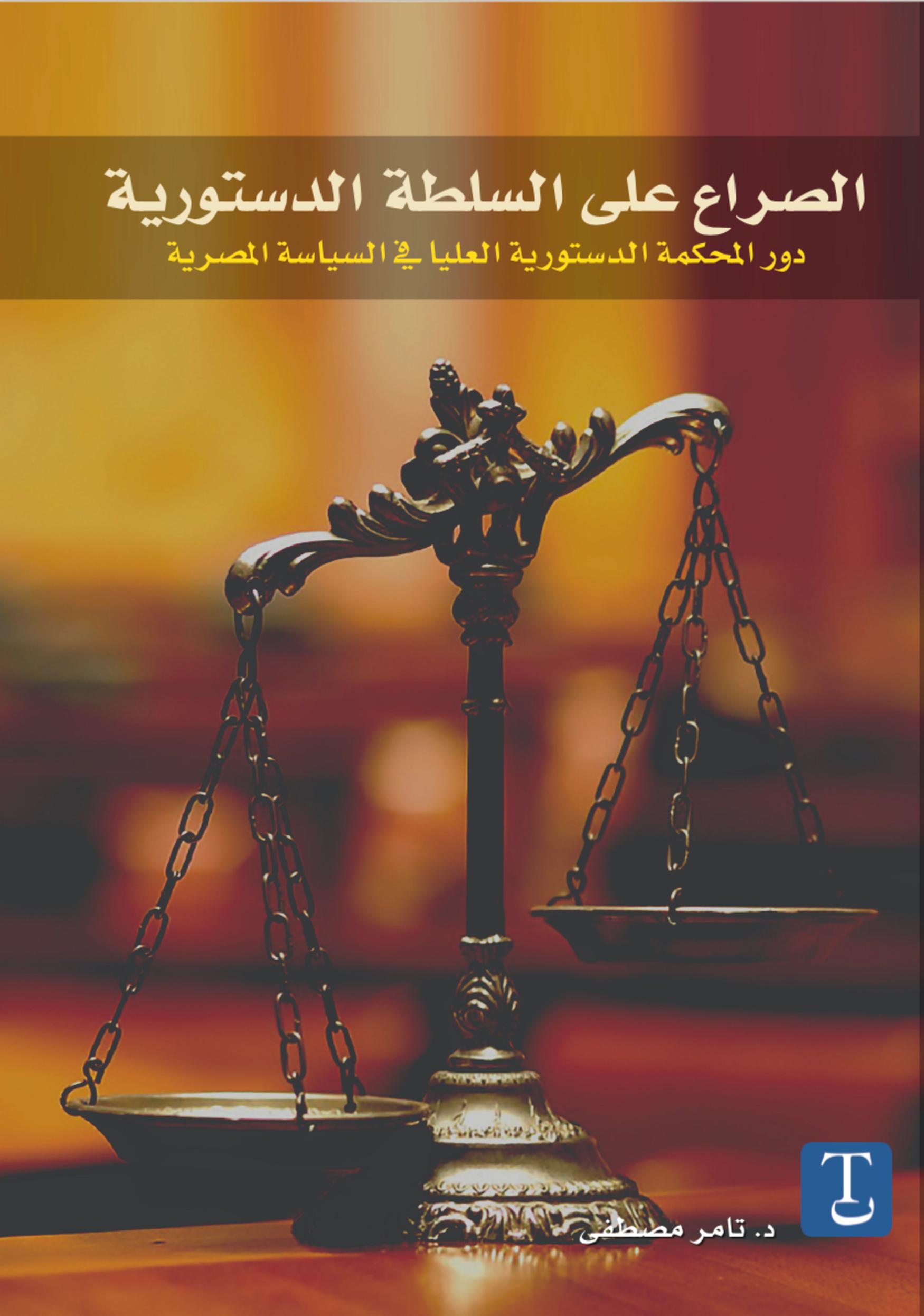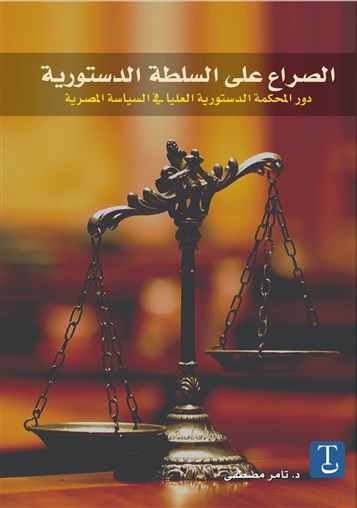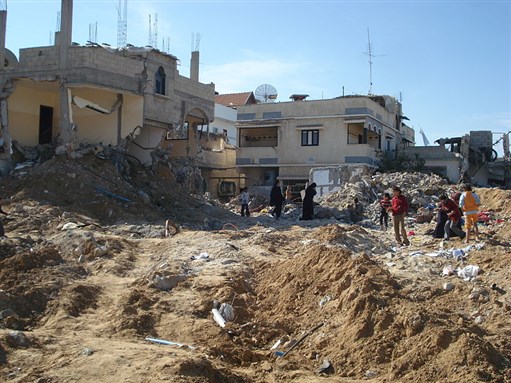نُشر هذا الكتاب للمرة الأولى في العام 2007 باللغة الإنجليزية بقلم الدكتور تامر مصطفى، أستاذ الدراسات الدولية في جامعة سايمون فريزر في كندا، وهو يقدم تحليلًا مفصلًا لتقاطع القانون والسياسة في مصر، مع تركيز خاص على المحكمة الدستورية العليا.
بالنسبة إلى العديد من القراء اليوم، قد تكون المحكمة الدستورية العليا معروفة أكثر للدور الذي لعبته في توجيه النتائج السياسية بعد سقوط الرئيس المصري السابق حسني مبارك في العام 2011، مع الأحكام المثيرة للجدل بإبطال مجلس الشعب ومجلس الشورى والجمعية التأسيسية فضلًا عن أحكام أخرى. بيد أن تحليل تلك الأحداث، التي ساعدت على رسم مصير جماعة "الإخوان المسلمين" واتجاه عملية الانتقال السياسي في مصر، يقع خارج نطاق هذه الدراسة. لكن هذه الأحكام تؤكد على الدور المركزي الذي لا تزال المحكمة الدستورية العليا تلعبه في تشكيل المشهد السياسي المصري. لذا، تقدم ترجمة كتاب تامر مصطفى للعام 2007 هذه تقريرًا من أكثر التقارير تفصيلًا، باللغتين العربية أو الإنجليزية، حول السياسة المحيطة بالمحكمة الدستورية العليا على مدى العقود الثلاثة الأولى من العملية.
نبذة عن الكاتب: تامر مصطفى هو أستاذ الدراسات الدولية في جامعة سايمون فريزر في فانكوفر، كندا. يدرّس ويكتب في مجالات القانون والمجتمع المقارن، والدين والسياسة في مصر والشرق الأوسط بشكل عام.
ملاحظة حول النص الأصلي: تم نشر هذا الكتاب للمرة الأولى في العام 2007 باللغة الإنجليزية تحت عنوان الصراع على السلطة الدستورية: القانون والسياسة والتنمية الاقتصادية في مصر، مطبعة جامعة كامبري.
من مقدمة الطبعة العربية
منذ إنشائها في العام 1979، لعبت المحكمة الدستورية العليا دورًا محوريًا في الحياة السياسية المصرية. فبصفتها المحكمة الوحيدة التي تتمتع بسلطة إلغاء القوانين التي تعتبرها غير دستورية، كان القضاة والناشطون السياسيون يشككون في البداية في عمل هذه المحكمة. لكن بعد وقت قصير من تأسيسها، أصبحت المحكمة تشكل موضوعًا حرجًا بين الحكومة والناشطين من جميع الأطياف، أي من الليبراليين واليساريين والإسلاميين وصولًا إلى منظمات حقوق الإنسان والأحزاب السياسية المعارضة والمواطنين العاديين، الذين قدموا كلهم التماسات تطعن في دستورية التشريعات الحكومية. في خلال هذه العملية، لعبت المحكمة الدستورية العليا دورًا رئيسيًا في الفصل في أهم القضايا السياسية الراهنة. وفي بعض المجالات مثل السياسة الاقتصادية، دعمت المحكمة الدستورية العليا برنامج تحرير الحكومة. إذ صدرت عشرات الأحكام في مجالات الخصخصة والإسكان وقانون العمل أدت إلى قلب السياسات الاقتصادية من عهد الرئيس المصري السابق جمال عبد الناصر، مما أدى بدرجة كبيرة إلى إثارة غضب اليساريين. أما في مجالات أخرى، مثل الحريات المدنية والحقوق السياسية وحرية الصحافة، فقد أصبحت المحكمة الدستورية العليا أشبه ببطلة بالنسبة إلى العديد من الناشطين السياسيين، حتى في الوقت الذي صادقت فيه على بعض أهم أدوات النظام للقمع القانوني، بما في ذلك محاكمة المدنيين في محاكم أمن الدولة. وفي مجالات إضافية، تفادت المحكمة الدستورية العليا ببساطة بعض القضايا الأكثر إثارة للجدل، بما في ذلك التحديات التي يطرحها الإسلاميون على أساس المادة الثانية من الدستور.
الكاتب عن
تامر مصطفى: أستاذ الدراسات الدولية وأستاذ كرسي ستيفن جاريسلوسكي في جامعة سيمون فريزر في كندا. يتمحور بحثه على تقاطع القانون المقارن والمجتمع، الدين والسياسة، وعلاقات الدولة- المجتمع، ويركز على الشرق الأوسط وعلى جنوب شرق آسيا.
تمحور مشروع مصطفى الرئيسي الأول على المحكمة الدستورية العليا في مصر وسياسة المحاكم في الأنظمة الاستبدادية بشكل عام أكثر. وأتى هذا أكله في نشر كتاب الصراع على السلطة الدستورية: القانون، السياسة والتنمية الاقتصادية في مصر (مطبعة جامعة كامبردج 2007) و حكم القانون: سياسة المحاكم في الأنظمة الاستبدادية (مطبعة جامعة كمبردج 2008، حُرِّر بالاشتراك مع توم غنسبرغ).
حصل مصطفى على زمالات في كل من جامعة بيركلي، جامعة برنستون، كلية هارفارد للقانون وسُمِّيَ باحثاً بكارنيغي في 2007 بسبب عمله حول الشريعة الإسلامية والحقوق الليبرالية.
[اضغط/ي هنا للمزيد من التفاصيل على تدوين]


![Now Available at Tadween Publishing in Partnership with Tadamun: "Planning [in] Justice العدالة في التخطيط"](https://kms.jadaliyya.com/Images/135x94xo/covers210326041535580~.png)
















